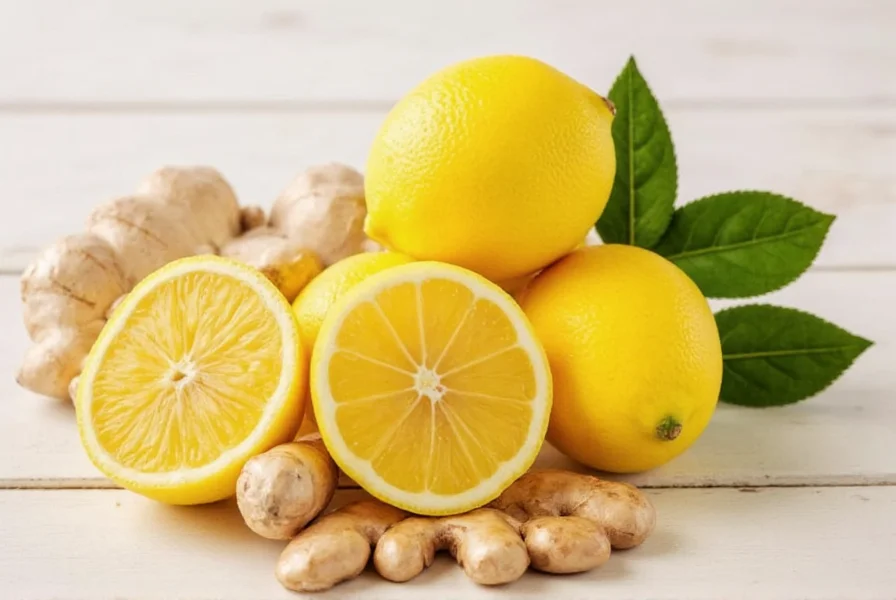Lemon ginger has become a staple in natural wellness routines worldwide, and for good reason. This dynamic duo combines the zesty citrus punch of lemon with the spicy warmth of ginger to create a beverage that's both refreshing and therapeutic. Unlike many trendy health remedies, lemon ginger has substantial scientific backing supporting its traditional uses in Ayurvedic and Traditional Chinese Medicine.
The Science Behind Lemon Ginger's Power
Ginger contains potent bioactive compounds called gingerols and shogaols, responsible for its characteristic heat and many health benefits. Research published in the Journal of Ethnopharmacology confirms ginger's effectiveness against nausea and vomiting, making it particularly valuable for morning sickness and motion sickness. Lemon contributes significant vitamin C and flavonoids that enhance ginger's effects while providing their own antioxidant benefits.
| Key Compound | Source | Primary Benefits |
|---|---|---|
| Gingerols | Ginger root | Anti-nausea, anti-inflammatory, pain relief |
| Vitamin C | Lemon juice | Immune support, antioxidant protection |
| Hesperidin | Lemon peel | Vascular health, anti-inflammatory |
| Shogaols | Dried/processed ginger | Enhanced bioavailability, stronger anti-nausea effects |
Research-Backed Health Benefits of Lemon Ginger
When exploring lemon ginger tea benefits, scientific evidence supports several key applications. A comprehensive review in Nutrition Journal found ginger significantly reduces symptoms of functional dyspepsia, a common digestive disorder. The citric acid in lemon works synergistically with ginger to stimulate digestive enzymes, making this combination particularly effective for post-meal discomfort.
For those seeking lemon ginger immune support, the vitamin C from lemon enhances white blood cell function while ginger's anti-inflammatory properties help modulate immune responses. During cold and flu season, this combination provides symptomatic relief without the drowsiness associated with many over-the-counter medications.
Research in the Journal of Pain demonstrates ginger's effectiveness in reducing muscle pain and soreness. Athletes incorporating lemon ginger shots into their recovery routine report faster resolution of exercise-induced inflammation. The lemon component helps neutralize the strong taste of concentrated ginger while adding its own therapeutic compounds.
How to Make Lemon Ginger Tea: Optimal Preparation Methods
Understanding how to make lemon ginger tea properly maximizes its therapeutic potential. For best results, use fresh ingredients rather than powdered alternatives. Here's a science-backed preparation method:
- Peel and thinly slice 1-2 inches of fresh ginger root
- Add to 2 cups of near-boiling water (not quite boiling to preserve vitamin C)
- Simmer covered for 10-15 minutes (longer for stronger tea)
- Remove from heat and add juice of half a lemon
- Let steep an additional 5 minutes before straining
This preparation method preserves the heat-sensitive vitamin C from lemon while extracting maximum gingerols from the ginger. Avoid adding honey until the tea cools slightly to preserve its beneficial enzymes. For those interested in lemon ginger shot recipe variations, concentrate the ingredients by using less water for a more potent daily dose.

When to Drink Lemon Ginger Tea for Maximum Benefits
The timing of consumption significantly impacts lemon ginger's effectiveness. For digestive support, consume 20 minutes before meals to stimulate digestive enzyme production. When addressing nausea, sip small amounts throughout the day rather than consuming large quantities at once.
Morning is an ideal time for lemon ginger tea benefits related to metabolism and immune function. The warm liquid helps rehydrate after sleep while ginger stimulates circulation. Many people report improved morning digestion and reduced bloating when making this their first beverage of the day.
For those using lemon ginger for digestion issues related to rich meals, consume within 30 minutes after eating. The combination helps break down fats and proteins while soothing the gastrointestinal tract. Evening consumption may interfere with sleep for some sensitive individuals due to ginger's mild stimulating properties.
Potential Side Effects and Important Precautions
While generally safe, understanding lemon ginger side effects is crucial for responsible consumption. Excessive intake (more than 4 grams of ginger daily) may cause heartburn, especially in those with GERD. The citric acid in lemon can erode tooth enamel when consumed frequently, so drinking through a straw and rinsing with plain water afterward is recommended.
Individuals taking blood thinners should consult their healthcare provider before regular lemon ginger consumption, as ginger may enhance anticoagulant effects. Those with gallstones should exercise caution as ginger may increase bile production. Pregnant women can typically enjoy moderate amounts (up to 1 gram of ginger daily) for morning sickness relief, but should discuss with their obstetrician.

Integrating Lemon Ginger Into Your Wellness Routine
For optimal results with lemon ginger immune support, consistency matters more than quantity. Daily consumption provides cumulative benefits rather than immediate effects. Start with smaller amounts to assess tolerance, gradually increasing to find your ideal dosage. Many wellness practitioners recommend cycling usage—3 weeks on, 1 week off—to maintain effectiveness.
Consider these practical applications based on your specific needs:
- For digestive health: Consume before meals
- For immune support: Drink in the morning
- For nausea relief: Sip small amounts throughout the day
- For post-workout recovery: Consume within 30 minutes of exercise











 浙公网安备
33010002000092号
浙公网安备
33010002000092号 浙B2-20120091-4
浙B2-20120091-4